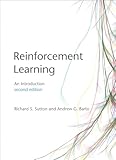Reinforcement learning [2nd ed.] : an introduction
Language: English Series: Adaptive computation and machine learning | / edited by Francis BachPublication details: MIT Press 2018 CambridgeEdition: 2nd edDescription: xxii, 526pISBN:- 9780262039246
- 006.31 Su87r2
| Item type | Current library | Collection | Call number | Status | Date due | Barcode | Item holds | |
|---|---|---|---|---|---|---|---|---|
 Books
Books
|
PK Kelkar Library, IIT Kanpur | General Stacks | 006.31 Su87r2 (Browse shelf(Opens below)) | Checked out to Lavanya Pareek (S24127004100) | 19/07/2025 | A185373 |
Browsing PK Kelkar Library, IIT Kanpur shelves, Collection: General Stacks Close shelf browser (Hides shelf browser)

|

|
No cover image available |

|

|

|

|
||
| 006.31 Su35i Introduction to statistical machine learning | 006.31 Su35m Machine learning in non-stationary environments | 006.31 SU87R REINFORCEMENT LEARNING | 006.31 Su87r2 Reinforcement learning [2nd ed.] an introduction | 006.31 T417E EXPLANATION-BASED NEURAL NETWORK LEARNING | 006.31 V426 Variants of evolutionary algorithms for real-world applications | 006.31 Z617e Ensemble methods |
The significantly expanded and updated new edition of a widely used text on reinforcement learning, one of the most active research areas in artificial intelligence.
Reinforcement learning, one of the most active research areas in artificial intelligence, is a computational approach to learning whereby an agent tries to maximize the total amount of reward it receives while interacting with a complex, uncertain environment. In Reinforcement Learning, Richard Sutton and Andrew Barto provide a clear and simple account of the field's key ideas and algorithms. This second edition has been significantly expanded and updated, presenting new topics and updating coverage of other topics.
Like the first edition, this second edition focuses on core online learning algorithms, with the more mathematical material set off in shaded boxes. Part I covers as much of reinforcement learning as possible without going beyond the tabular case for which exact solutions can be found. Many algorithms presented in this part are new to the second edition, including UCB, Expected Sarsa, and Double Learning. Part II extends these ideas to function approximation, with new sections on such topics as artificial neural networks and the Fourier basis, and offers expanded treatment of off-policy learning and policy-gradient methods. Part III has new chapters on reinforcement learning's relationships to psychology and neuroscience, as well as an updated case-studies chapter including AlphaGo and AlphaGo Zero, Atari game playing, and IBM Watson's wagering strategy. The final chapter discusses the future societal impacts of reinforcement learning.
There are no comments on this title.

